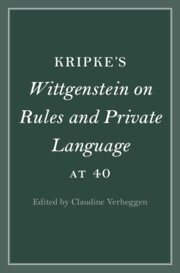Book contents
- Kripke’s Wittgenstein on Rules and Private Language at 40
- Cambridge Philosophical Anniversaries
- Kripke’s Wittgenstein on Rules and Private Language at 40
- Copyright page
- Dedication
- Contents
- Contributors
- Acknowledgments
- Introduction
- 1 Kripke’s Wittgenstein’s Skepticism about Rules and Meaning
- 2 Putting Wittgenstein Back into Kripkenstein:
- 3 Answering Kripke’s Skeptic
- 4 Wittgensteinean Notions of Uniformity and Kripkensteinean Skepticism
- 5 Wittgenstein’s Naturalism and the Skeptical Paradox
- 6 Kripke and Wittgenstein on Rules and Meaning
- 7 Semantic Normativity, Properly So Called
- 8 What Is the Skeptical Problem? Wittgenstein’s Response to Kripke
- 9 How Not to Brush Questions under the Rug
- 10 Quadders and Zombies
- 11 Communitarianism, Interpersonalism, and Individualism in Kripke’s “Skeptical Solution”
- 12 “Considered in Isolation”
- 13 The Meaning of Meaning Ascriptions
- Bibliography
- Index
7 - Semantic Normativity, Properly So Called
Published online by Cambridge University Press: 22 February 2024
- Kripke’s Wittgenstein on Rules and Private Language at 40
- Cambridge Philosophical Anniversaries
- Kripke’s Wittgenstein on Rules and Private Language at 40
- Copyright page
- Dedication
- Contents
- Contributors
- Acknowledgments
- Introduction
- 1 Kripke’s Wittgenstein’s Skepticism about Rules and Meaning
- 2 Putting Wittgenstein Back into Kripkenstein:
- 3 Answering Kripke’s Skeptic
- 4 Wittgensteinean Notions of Uniformity and Kripkensteinean Skepticism
- 5 Wittgenstein’s Naturalism and the Skeptical Paradox
- 6 Kripke and Wittgenstein on Rules and Meaning
- 7 Semantic Normativity, Properly So Called
- 8 What Is the Skeptical Problem? Wittgenstein’s Response to Kripke
- 9 How Not to Brush Questions under the Rug
- 10 Quadders and Zombies
- 11 Communitarianism, Interpersonalism, and Individualism in Kripke’s “Skeptical Solution”
- 12 “Considered in Isolation”
- 13 The Meaning of Meaning Ascriptions
- Bibliography
- Index
Summary
Kripke finds in Wittgenstein an argument for the view that there is no such thing as meaning. A key premise in that argument is that there are semantic norms – norms governing the uses of expressions that hold in virtue of what those expressions mean. Standardly, those norms are understood to be norms of truth – roughly, they permit truly applying expressions and prohibit falsely applying them. An increasing number of philosophers reject the standard interpretation. In this chapter, I explore alternative construals due to Alan Millar and Indrek Reiland and argue that they are either unmotivated or not competitors with the standard account. In doing so, I defend a kind of pluralism about semantic normativity. If there are norms of truth that hold in virtue of what expressions mean, there will be further norms that make reference to the doxastic, epistemic, and motivational states of language-users, norms that are explanatory posterior to the norms of truth.
- Type
- Chapter
- Information
- Kripke's Wittgenstein on Rules and Private Language at 40 , pp. 124 - 141Publisher: Cambridge University PressPrint publication year: 2024
- 1
- Cited by

